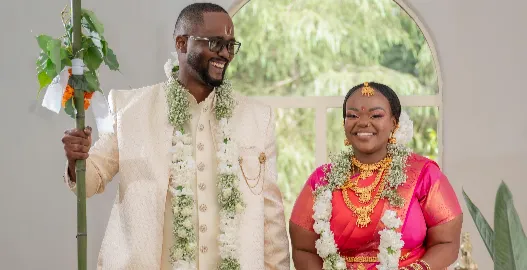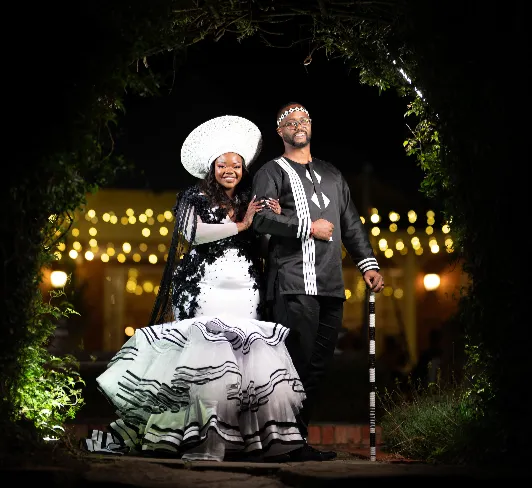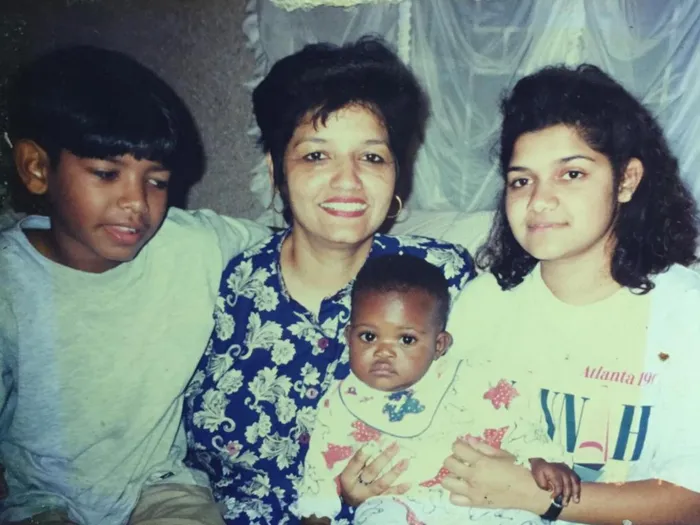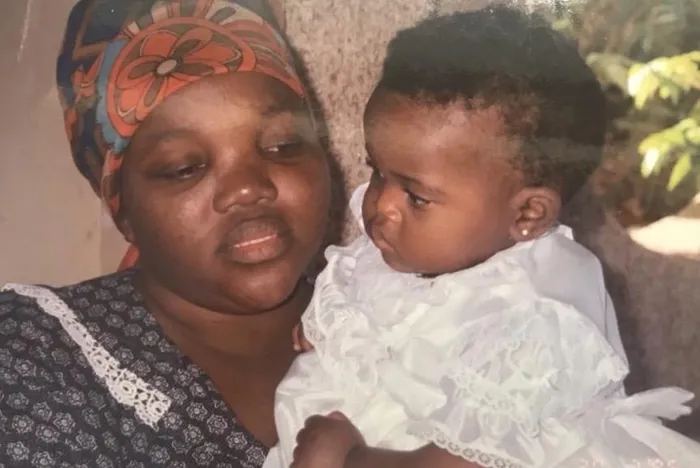
Mzolo Padayachee and her husband Buntu Nondumo at their South Indian wedding in the KZN Midlands.
Image: Supplied
From two mothers and two cultures to a marriage uniting communities, Chatsworth’s Sandi Mzolo Padayachee, 31, reminds us that our shared humanity is greater than what divides us.
RAISED by an Indian adoptive family while embracing herZulu roots, Sandi Mzolo Padayachee’s cross-cultural marriage has became a viral symbol of South Africa’s united future.
Her extraordinary journey between two worlds offers powerful lessons on love, identity, and the bridges we can build across communities.
Sandi’s journey began under extraordinary circumstances and it started when she was adopted – when she was just an hour old – by the late women’s right activist, Dr Anshu Padayachee, and her husband, Preggy.
She grew up in Clare Estate with the love of two mothers – her biological mother, Dolly Mzolo, who had worked for the family and her adoptive mom, Anshu.

The couple in their traditional Xhosa outfits at their reception.
Image: Supplied
“I grew up very privileged having two moms. Both impacted my life in different but very special ways,” she recalled.
Raised in a Hindu household while proudly holding on to her Zulu heritage, Sandi never saw herself as different. But school life reminded her of the barriers which still existed.
“I wanted to sit with both black and Indian kids, but school was divided by colour. Speaking English was also a challenge. Sometimes it made me look like I thought I was better, which wasn’t true,” she said.

Dr Sumesh Padayachee, Dr Anshu Padayachee, Levanya Padayachee with baby Sandile
Image: supplied
However, her life today tells a different story.
As a research administrator at DUT with a Master’s in science, she is married to her Xhosa husband Buntu Nondumo.
Their vibrant intercultural wedding – weaving South Indian traditions, isiXhosa and her African roots – captivated South Africans. Their wedding video on TikTok went viral.
“Our marriage symbolises democracy and peace. This is what Mandela worked for: that we can live in harmony,” said Sandi.
For her husband, Buntu, the attraction went far beyond the cultural beauty of their union.
“What attracted me to my wife was her intellect, her open mind and the way she shows love and kindness to those around her regardless of their walks of life,” he said.
For communities like Chatsworth and Phoenix, Sandi’s words carry weight. These areas have been shaped by migration, resilience, and shared struggles.
Sandi’s message to youth navigating cross-cultural relationships is simple: “Love seesno colour, no race, and no religion. If someone has your best interests at heart, that’s all that matters.”
Nondumo echoed the same sentiment.
“I would tell young people to explore and really look into learning from other cultures because something may just attract you through the journey. And when you feel afraid todo it, you should do it,” Nondumo said.

Sandi's biological mother Dolly Mzolo (
Image: SUPPLIED
Heritage Month (September) holds special meaning for Sandi. She does not celebrate it with flags or slogans, but through the food she cooks and the songs she sings.
From chicken feet and steamed bread to curries and parathas, her kitchen is a living testament to her dual heritage. And whether she sings Tamil film songs or Zulu worship hymns, she feels equally grounded in both traditions. But perhaps her most powerful message is about adoption.
“Don’t be afraid of cultural differences. There are children who need homes. My parents raised me as Hindu, but also reminded me of my Zulu roots. It was my choice how to embrace them.”
In a time when communities like Chatsworth and Phoenix still wrestle with the legacy of apartheid and social cohesion, Sandi’s life offers hope.
“We need more love and learning, and less hate and judgement,” she added.
Her story is a reminder that heritage is not just about where we come from, but also about the bridges we choose to build.